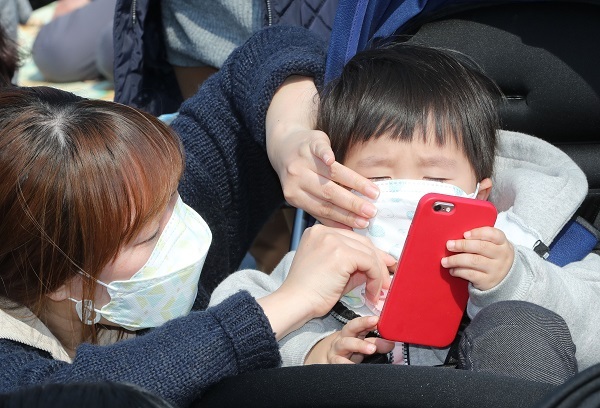Students in Seoul will be prohibited from participating in outdoor activities when fine dust levels are high, the city’s education authority said Monday, as it steps up measures to prevent health damage caused by air pollution.
The Seoul Metropolitan Office of Education notified primary to high schools in Seoul to refrain from outdoor activities when fine dust concentration levels exceed 50 micrograms per cubic meter and 25 micrograms per cubic meter for ultrafine dust.
 |
(Yonhap) |
Under the new guidelines, schools will be prohibited from holding classes outdoors when the level of fine dust is above 81 micrograms per cubic meter. Students will also be required to wear masks at all times during school hours.
Public concerns are rising over the government’s seemingly inept response to air pollution, which experts say will have a greater impact on children.
Classified as harmful by the World Health Organization, the invisible dust particles penetrate deep into the respiratory system and can cause a wide range of maladies, including cancer.
Last month, Seoul’s Air Quality Index reached 179 micrograms per cubic meter on one day, the second highest among major metropolitan cities in the world that day, trailing only Indian capital New Delhi, according to air quality monitoring website AirVisual.
The average level from January to March this year stood at 32 micrograms per cubic meter -- well above the World Health Organization air quality guidelines of 10 micrograms per cubic meter.
Under the new measures, the city plans to spend 670 million won ($584,000) to install air cleaning facilities at local schools in a test run starting from the second semester of the school year. It will also distribute government-approved dust masks for kindergarten and elementary school students.
“There have been many complaints from parents regarding insufficient anti-dust policies and lack of air cleaning systems at school,” said an official from the city, explaining why they came up with the plan.
While the main contributor of the air pollutants here is said to be China, according to claims by the government, experts warn the government should also strengthen cooperation with local bodies to better assess problems at home.
“Seoul City alone cannot solve the problem when the central government is still on a less tough stance on the same air pollution issue,” Lee Sae-geol, director of the Korea Federation for Environmental Movements, told The Korea Herald.
For a starter, the government should “follow WHO’s air assessment standard,” which sets the limit of 50 micrograms per cubic meter for fine dust and 25 for ultrafine dust measured on a daily basis, Lee said.
South Korea’s standard is exactly double the levels of the WHO, with the limit at 100 micrograms per cubic meter for fine dust and 50 for ultrafine dust.
“A preventive approach to reduce the dust itself is also as equally important as the city’s new countermeasures, which includes replacing diesel-operated school buses with environmentally friendly ones,” Lee added.
By Bak Se-hwan (
sh@heraldcorp.com)





![[Exclusive] Hyundai Mobis eyes closer ties with BYD](http://res.heraldm.com/phpwas/restmb_idxmake.php?idx=644&simg=/content/image/2024/11/25/20241125050044_0.jpg)
![[Herald Review] 'Gangnam B-Side' combines social realism with masterful suspense, performance](http://res.heraldm.com/phpwas/restmb_idxmake.php?idx=644&simg=/content/image/2024/11/25/20241125050072_0.jpg)

